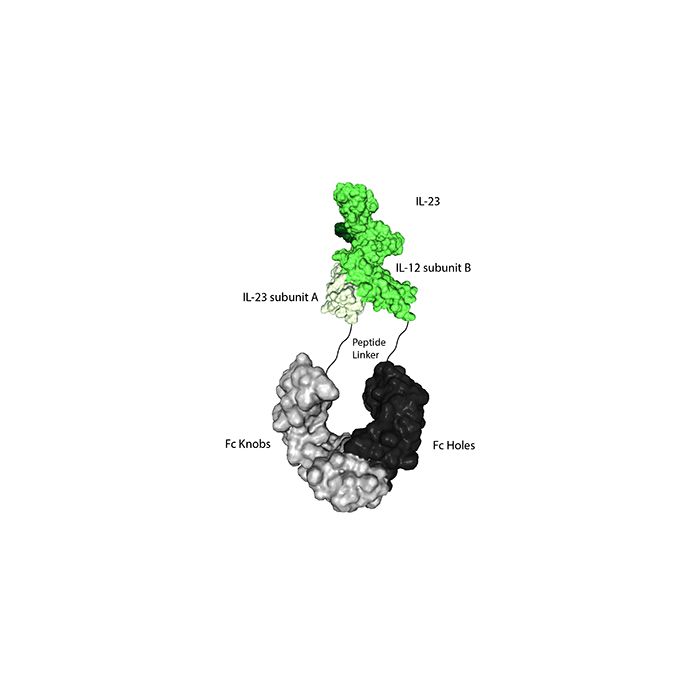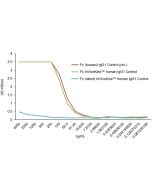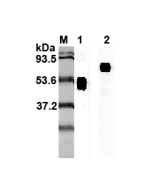Cookie Policy: This site uses cookies to improve your experience. You can find out more about our use of cookies in our Privacy Policy. By continuing to browse this site you agree to our use of cookies.
AdipoGen Life Sciences
IL-23 (mouse):Fc InVivoKine™

| Product Details | |
|---|---|
| Synonyms | IL-23 (mouse):Fc KIH (human) (rec.); IL-23p19; IL-23α; Interleukin-12 Subunit β; IL-12 Subunit p40 |
| Product Type | Protein |
| Properties | |
| Source/Host | CHO cells. Produced using animal component-free medium. |
| Sequence |
IL-23A/p19 (aa 22-196) (mouse):Fc Knobs and IL-12B/p40 (aa 23-335) (mouse):Fc Holes form the IL-23 (mouse):Fc-KIH (human) using the Knobs-into-Holes technology (see reference: J.B. Ridgway, et al.; Protein Eng. 9, 617 (1996)). |
| Crossreactivity |
Human Mouse |
| Specificity |
Binds to mouse and human IL-23R. |
| MW | ~75kDa and 55 kDa (SDS-PAGE) |
| Purity | ≥95% (SDS-PAGE) |
| Endotoxin Content | <0.01EU/μg purified protein (LAL test). |
| Concentration | 1mg/ml after reconstitution. |
| Reconstitution | Reconstitute with 50μl sterile water. |
| Formulation | Lyophilized. Contains PBS |
| Protein Negative Control | |
| Other Product Data |
UniProt link Q9EQ14: IL23A (mouse) UniProt link P43432 : IL-12B (mouse) |
| Shipping and Handling | |
| Shipping | BLUE ICE |
| Short Term Storage | +4°C |
| Long Term Storage | -20°C |
| Handling Advice |
After reconstitution, prepare aliquots and store at -20°C. Avoid freeze/thaw cycles. Centrifuge lyophilized vial before opening and reconstitution. PBS containing at least 0.1% BSA should be used for further dilutions. |
| Use/Stability |
Stable for at least 6 months after receipt when stored at -20°C. Working aliquots are stable for up to 3 months when stored at -20°C. |
| Documents | |
| MSDS |
 Download PDF Download PDF |
| Product Specification Sheet | |
| Datasheet |
 Download PDF Download PDF |
Interleukin-12 (IL-12) family members are heterodimer glycoproteins, composed of two covalently linked subunits, α and β chains. The α-subunit consists of IL-23p19, IL-27p28, and IL-12p35, and the β-subunit includes IL-12p40 and Epstein-Barr virus-induced gene (Ebi3). IL-12 members bind to cognate heterodimeric receptor chains expressed on T cells.
This family includes IL-12, IL-23, IL-27, IL-35 and IL-39. IL-12 and IL-23 are predominantly proinflammatory cytokines that contribute key roles in the development of Th1 and Th17 cells, respectively. IL-27 has both pro- and anti-inflammatory properties and is a potent T cell immunomodulator. IL-35, a new member of this family, is a potent inhibitory cytokine produced by natural, thymus-derived regulatory T cell (nTreg) populations. IL-39, the newest member of the IL-12 family, mediates the inflammatory response through the activation of STAT1/STAT3 signaling pathway. These IL-12 family members link innate immunity with the development of adaptive immunity and are also important for regulating T cell responses.
Interleukin-23 (IL-23) is composed of the IL-12 p40 chain covalently linked to p19, a chain related to the IL-12 p35 subunit. IL-23 signals through the IL-23 receptor complex, which is composed of the IL-12Rβ1 chain and a gp130-like chain, IL-23R. Triggering of the IL-23 receptor complex leads to the activation of Tyk2, Jak2 and STAT1, 3 and 4. IL-23 induces IFN-γ production, Th1 cell differentiation and activation of the antigen-presenting functions of dendritic cells. IL-23 induces autoimmune inflammation and thus may be responsible for autoimmune inflammatory diseases and important for tumorigenesis.
The IL-23 (mouse):Fc InVivoKine™ is produced by using two different vectors, one encoding for the IL-23A/p19:Fc Knobs sequence (synthesizing a protein of 55kDa) and one encoding for the IL-12B/p40:Fc Holes sequence (synthesizing a protein of 75kDa). Both vectors transfected into CHO cells produce both Fc molecules (Knobs-into-Holes technology; J.B. Ridgway, et al.; Protein Eng. 9, 617 (1996)) required for dimerization and for secretion of the final protein IL-23 (mouse):Fc InVivoKine™.
InVivoKines™ are a new generation of recombinant fusion proteins for immunotherapeutic, preclinical and translational in vivo research, developed and manufactured by AdipoGen Life Sciences.








